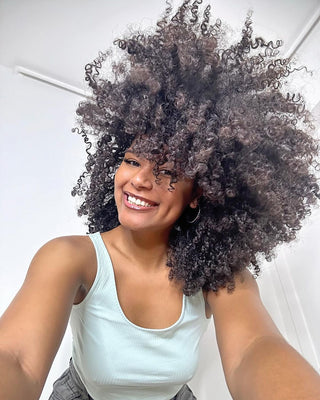So, you've had your little bundle of joy. The days are filled with diaper changes, breastfeeding, and beautiful moments of calm as you watch your baby sleep in your arms. Being a new mom is truly a whole new world of wonderful experiences. However, one thing you may not have been prepared for is the hair loss that can often occur after your pregnancy. Seriously nothing prepares you for those massive clumps of hair coming out of your comb on wash day.
But don't worry, you're not about to go bald. This type of hair loss is completely normal and can easily be fixed. In this article, we'll discuss some key steps to help you tackle post baby hair loss.
What Causes Postpartum Hair Loss?
Postpartum hair loss occurs as a result of a significant drop in estrogen levels after pregnancy. You’re probably wondering how that relates to your hair. See, normally the lifespan of every hair strand exists on different phases of the hair growth cycle. This includes the anagen (growth phase), catagen (transition phase), and telogen/exogen (resting or shedding phase).
Now, in the third trimester of your pregnancy, your estrogen levels increase, causing most of the hair to be in the catagen phase. You'll notice your hair was very full and luscious during this time. However, after your pregnancy, the decrease in estrogen levels makes many hair strands move into the telogen phase, causing them to eventually start falling off. This is why this type of hair loss is not considered true hair loss in the medical sense because it is more like extreme shedding. In fact, the more common technical for postpartum hair loss is telogen effluvium which basically means excessive shedding.
While postpartum hair loss is not guaranteed to happen to every person, it is very common amongst most people, so you are not alone in this experience.
How Much Hair Loss Is Normal?
Naturally, we all shed about 70-100 hairs a day even without pregnancy hormones, so it is normal to notice some hair fall while you comb or wash– that does not necessarily mean you are experiencing postpartum hair loss. However, when you start to find a lot of loose hair strands on your clothing and pillow and notice an increase in the amount of hair that comes off while you try to detangle, then you are likely having postpartum shedding. The amount of hair each person loses will vary but anything more than the usual 100 will be a clear sign you are shedding. Some people can even lose as much as 300 hairs a day.
When Does Postpartum Hair Loss Stop?
While it may seem like there is no end in sight, you only have to go through this for a short period of time. By the time your child reaches their first birthday, all the postpartum shedding will stop completely, and your hair will return to normal. But before that time comes, let's find you a few ways to minimise the effects of your current shedding phase.

9 Ways To Tackle Postpartum Hair Loss
- Keep Your Curls Hydrated:
One of the best ways to reduce the amount of hair loss you get is to always make sure your curls are properly moisturised. Curly hair is naturally prone to dryness but when you are postpartum, you may notice an increase in dryness as a result of the shedding. To combat this, you need to consistently hydrate your hair with Sofnfree's water-based Manuka Honey & Avocado leave-in Conditioner 2-3 times a week. It's hair-strengthening and antioxidant properties will keep your curls from weakening while also locking in moisture.
If you prefer a more lightweight moisturiser, you can easily spray, then you can use our Everyday Curl Refresher With Coconut & Jamaican Black Castor Oils to help nourish and replenish your curls with moisture.
- Avoid Harsh Shampoos:
Harsh shampoos can dry out your curls and increase shedding and breakage. So, it is best to use gentle shampoos that will cleanse your hair without stripping off its natural oils. Opt for a hydrating shampoo like Sofnfree's Hydration Shampoo With Manuka Honey to help nourish and hydrate your curls. Keep in mind that you do not have to wash your hair every week, but it is also important not to leave the hair dirty for too long. Try to keep consistently wash at least once every two weeks.
- Be Gentle With Your Curls:
To prevent further breakage, it is very important to be very gentle when you handle your curls. The strands are likely very fragile in this state so any excess mechanical stress applied to them may increase the amount of hair you lose. Use the right detangling tools when combing your hair and work from your ends to the roots. If possible, try to finger detangle as much as you can before using combs and brushes. You can also apply our Moisture Rich Conditioner to help soften and lubricate the strands as you detangle.
Additionally, try to handle small sections of hair when you are styling or manipulating the hair to minimise friction and damage to your delicate tresses.

- Apply Oil On Your Scalp:
A dry scalp can easily become itchy and inflamed because it lacks the right nutrients and the more you try to scratch your scalp, the higher your chances of increased shedding. So, it is very essential to nourish your scalp with an oil like our Strengthening Oil to maintain the health of your scalp and strengthen your hair.
If you want an oil you can use on your scalp and use to lock moisture into your hair, you can use our Hair & Scalp Oil.
- Deep Condition More Frequently:
Another great way to ensure your curls get the right nourishment and help minimise hair loss is to load up on deep conditioners. These deep hair conditioning masks are designed to strengthen the strands and flood the hair with moisture. Our Deep Conditioning Hair Mask With Manuka Honey & Avocado is a rich formula that will give your hair the rejuvenation it needs to remain healthy. It prevents breakage and leaves your hair super soft and smooth, making it easier to manage and handle. Try deep conditioning the hair for about 20 minutes after every wash.
- Avoid heat styling:
Applying heat to the hair while it is shedding can increase the amount of hair loss you get. This is because heat styling can weaken your hair strands and increase your risk of getting heat damage. So, to keep your curls as healthy as possible, stay away from flat irons. If you must use a blow dryer, try to use the cooler heat settings.
- Opt For Low Tension Hairstyles
Since your strands are in a delicate state, it is best to avoid doing any hairstyle that could put unnecessary tension on the hair. Anything too tight can easily make things worse and increase the amount of hair loss you get. So, stick with low tension hairstyles like loose buns, loose twists, and wash n go's.
- Limit stress:
Stress is a major contributing factor to most forms of hair loss. Now, when you're dealing with a newborn, chances are you are sleep deprived and also physically tired and if you do not give your body the space to recuperate, it can increase your postpartum hair loss. This is why it is very essential to find time to take care of your physical well-being. Try to get as much rest and sleep as you possibly can. You will feel much more refreshed, and your curls will thank you for it.
- Consume A Healthy Diet:
After having a baby, it can be very easy to neglect your diet since you are likely too focused on caring for the baby. However, you gotta make sure you are eating a healthy and nutritionally balanced diet to enrich your hair with the essential vitamins and proteins it needs. This will help nourish your curls and reduce the rate of hair loss.
Try to include things like fish, nuts, meat, leafy green, beans, and dairy, in your daily meals. These will replenish your body with fatty acids, and vitamins A, C, E, B, and E, all of which are important for maintaining the health of your strands.
If your postpartum shedding is excessive, it may be helpful to give your hair an extra boost of nourishment by taking hair vitamins. There are many of these hair-boosting supplements out there so before you make a decision, have a conversation with your doctor about which ones are right for you and whether it is okay for you to take them with any other postnatal supplements you may be taking.
So, there you have it, some very important tips to help keep your curls healthy and minimise hair loss on your way to postpartum recovery. After having a baby, your hair should be the least of your worries. So, stick with the tips in this article and your curls will snapback before you know it

